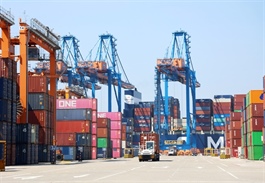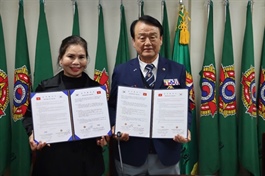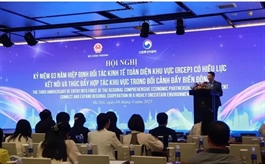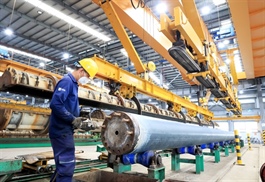Reciprocal tax will drastically undermine competitiveness of Vietnamese products
Reciprocal tax will drastically undermine competitiveness of Vietnamese products
The implementation of 46 per cent reciprocal tax by the US on April 9 threatens to inflict severe damage on Vietnam's export-driven economy. Nguyen Chi Trung, CEO and managing partner of Grant Thornton Vietnam, shares his thoughts on the implications.

Nguyen Chi Trung, CEO and managing partner of Grant Thornton Vietnam. |
This policy imposes a steep tariff on a vast majority of Vietnamese goods, positioning Vietnam as one of the most heavily taxed exporters to the US market. Key industries, including textiles, electronics, footwear, and wood products, are bracing for a profound shock.
In 2024, Vietnam's exports to the US totalled $119.5 billion, with these sectors representing significant portions: textiles ($16.2 billion, 13.5 per cent), electronics ($23.2 billion, 19.4 per cent), footwear ($8.3 billion), and wood products ($9 billion). The 46 per cent tariff, acting as a substantial surcharge, will drastically undermine the competitiveness of these Vietnamese products.
The textiles sector, reliant on the US for nearly 50 per cent of its output, faces immediate disruption. Increased costs are likely to drive US buyers towards cheaper alternatives in countries like Bangladesh or India. Footwear manufacturers, suppliers to major brands like Nike and Adidas, will struggle to maintain profit margins. The electronics sector, a key manufacturing hub, will see its strategic advantage eroded, potentially prompting costly and disruptive relocations. The wood and furniture industry, which heavily depends on the US market, faces similar risks, further complicated by past scrutiny.
In summary, the 46 per cent tariff poses a direct and significant threat to Vietnam's export sector. A sharp decline in export volumes, substantial revenue losses, potential job cuts, and widespread supply chain disruptions are imminent.
It is crucial for the government to adopt strategic policies to remove obstacles, support negotiations with the US, and leverage free trade agreements to navigate these challenges and seize new opportunities. To mitigate this impact, Vietnam should prioritise many parallel solutions, including strengthening diplomatic engagement, enhancing trade facilitation, leveraging trade agreements, supporting domestic industries, encouraging innovation and value addition, and strengthening regional cooperation.
To mitigate the adverse effects of the new tariffs, Vietnam should prioritise diplomatic engagement with the US. Establishing a high-level dialogue to negotiate mutually beneficial outcomes can help alleviate some of the tariff burdens. This approach requires a dedicated task force comprising representatives from relevant ministries, industry associations, and key stakeholders to present a unified front in negotiations. The immediate objective is to negotiate with the US to extend the timeframe. Instead of implementing it from April 9, negotiations should aim to achieve a delay and use that time for further agreements.
Improving trade facilitation measures is essential to reduce the cost and time associated with exporting goods. The government should streamline customs procedures, enhance transparency, and adopt digital solutions to expedite trade processes. By reducing bureaucratic hurdles, Vietnam can enhance its competitiveness and attract more foreign investment.
Vietnam has a robust network of trade deals, including agreements with the European Union, Canada, and several ASEAN countries. The government should actively promote these agreements to diversify export markets and reduce dependency on the US. This involves organising trade missions, participating in international trade fairs, and providing support to businesses.
To cushion the impact of the tariffs, the government should provide targeted support to key export sectors such as electronics, textiles, wood products, and footwear. This support can include financial incentives, tax breaks, and subsidies to help businesses absorb the increased costs and maintain their competitiveness in the global market.
In addition, Vietnam should focus on enhancing the value addition of its exports by promoting innovation and technology adoption. Investing in research and development, fostering public-private partnerships, and providing incentives for high-tech industries can help Vietnamese products move up the value chain and reduce vulnerability to tariff shocks.
Last but not least, Vietnam should strengthen its regional cooperation efforts, particularly within ASEAN, to create a more integrated and resilient supply chain. Collaborating with neighbouring countries on trade facilitation, infrastructure development, and regulatory harmonisation can enhance Vietnam's position as a regional trade hub.
- 09:00 06/04/2025























